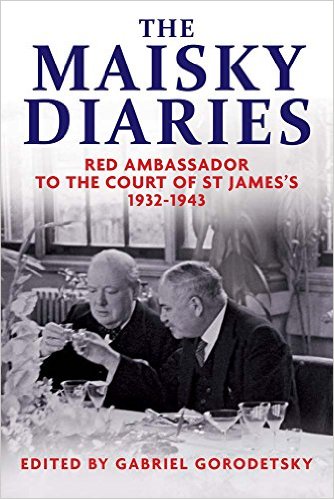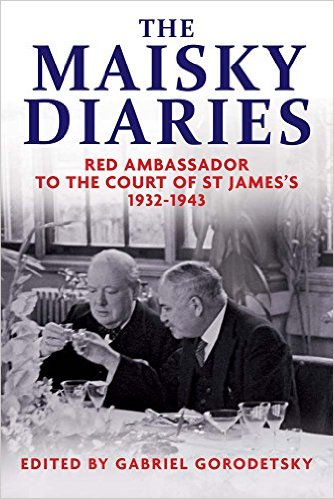
Finest Hour 173
Books, Arts, & Curiosities – Stalin’s Man in London

August 14, 2016
Finest Hour 173, Summer 2016
Page 40
Gabriel Gorodetsky, ed., The Maisky Diaries, Red Ambassador to the Court of St. James’s 1932–1943, Yale University Press, 2015, 632 pages, $40.
ISBN 978–0300180671
Review by D. Craig Horn
D. Craig Horn is a former Russian linguist for the United States Air Force currently serving in the North Carolina General Assembly. He is chairman of the Churchill Society of North Carolina and serves on The Churchill Centre’s Board of Trustees.
 Winston Churchill once famously described Russia as “a riddle wrapped in a mystery inside an enigma.” Such terms can be equally applied to Ivan Mikhailovich Maisky, Soviet ambassador to London from 1932–43. Just think for a minute about the world-shaking events of those years. In every instance, Ivan Maisky chronicled them in fascinating detail.
Winston Churchill once famously described Russia as “a riddle wrapped in a mystery inside an enigma.” Such terms can be equally applied to Ivan Mikhailovich Maisky, Soviet ambassador to London from 1932–43. Just think for a minute about the world-shaking events of those years. In every instance, Ivan Maisky chronicled them in fascinating detail.

2025 International Churchill Conference
The Maisky Diaries present not only a behind-the-curtain look at diplomacy and deception but also a story of intrigue and survival. Ambassador Maisky wormed himself into the innermost workings of the British government; he was the ultimate maker of friends in high places. His address book included private contacts at the highest levels of officialdom, journalism, diplomats, and political insiders. Through sheer ability and a cunning strategy, Maisky constantly put himself in the right place at the right time.
We are indebted to Professor Gabriel Gorodetsky for his incredible work that took more than ten years of exhaustive research and to Tatiana Sorokina and Oliver Ready for the translation that not only captures the sense and meaning of every word and phrase but also the literary talent of a unique and fascinating man. No other personal document of such breadth, value, and size has emerged from the Soviet Archives.
Maisky, an early revolutionary, who in 1919 at age thirty-five abandoned the Mensheviks to join the Bolsheviks, endeared himself to great men of the age: David Lloyd George, Anthony Eden, Joseph Kennedy, Leo Amery, Max Beaverbrook, Lady Astor (whom he described as “a crazy woman),” and Winston S. Churchill. Maisky’s first encounter with Churchill appears to have been in November 1934 at a royal wedding at Westminster Abbey. It was the first time that Maisky has been in a church in decades. Over the ensuing nine years, Maisky and Churchill met frequently to exchange views, swap stories and jokes and, most likely, consume a bit of alcohol.
Not the least of the intrigues in this marvelous work is how Maisky and his wife, Agniya, navigated the vagaries of the Soviet government that ebbed and flowed as a result of Stalin’s paranoia. Called back to Moscow during the height of the purges, Maisky delicately avoided falling into the abyss of an on-going Soviet purge. But, in the end, his own success resulted in his demise as he was arrested, tried, and convicted, not for a political crime but an administrative one.
Despite having incredible access to British power, insight into western policy, and excellent intelligence value, Maisky was not always trusted by the Soviet leadership. He was wrong on most big issues: the opening of the elusive second front and the Nazi perfidy, to name but a few. Yet he understood the British and was able to protect the interests of his homeland.
The Maisky Diaries reveal a vast amount of new information about Churchill’s prewar and wartime musings; they contain many new anecdotes and witticisms, as well as an insight into what others were saying about Churchill. Maisky obviously held Churchill in high regard, and there are fascinating details of the many one-on-one meetings that the two had at familiar locations such as Chartwell, Chequers, and Number 10, as well as in Maisky’s private quarters in the Soviet Embassy in London. Their frequent encounters at social and political events from football games to funerals often resulted in sidebar conversations that revealed policy and personnel changes that are all chronicled in these diaries.
But, in the end, they both knew that when Maisky was summoned to Moscow in 1943, the termination of an era was at hand. The inherent insecurity of the Soviet leadership moved to checkmate its own best chess piece. Maisky was ever the best defender of the very same power that he knew to be his mortal enemy. Nevertheless, he remained confident in his own abilities; he knew well the art of walking the diplomatic tightrope.
The Maisky Diaries is an indispensable resource for historians, students, and researchers: a primer for the arts of statesmanship and international relations work from the vantage point of one who understood the game and whose instincts served him well. Make no mistake: this is not an easy read, but it is an important one. Although Churchill is renowned as the British bulldog, Maisky was a bulldog of a different breed. These were men whose fortitude and dedication will stand forever as an example of loyalty to their cause.
Subscribe
WANT MORE?
Get the Churchill Bulletin delivered to your inbox once a month.



